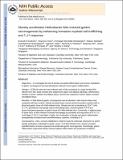Obesity accelerates Helicobacter felis-induced gastric carcinogenesis by enhancing immature myeloid cell trafficking and TH17 response
Author(s)
Ericksen, Russell E.; Rose, Shannon; Westphalen, Christoph Benedikt; Shibata, Wataru; Muthupalani, Sureshkumar; Tailor, Yagnesh; Friedman, Richard A.; Han, Weiping; Fox, James G.; Ferrante, Anthony W.; Wang, Timothy C.; ... Show more Show less
DownloadFox_Obesity accelerates.pdf (2.235Mb)
OPEN_ACCESS_POLICY
Open Access Policy
Creative Commons Attribution-Noncommercial-Share Alike
Terms of use
Metadata
Show full item recordAbstract
Objective: To investigate the role of obesity-associated inflammation and immune modulation in gastric carcinogenesis during Helicobacter-induced chronic gastric inflammation.
Design: C57BL/6 male mice were infected with H felis and placed on a high-fat diet (45% calories from fat). Study animals were analysed for gastric and adipose pathology, inflammatory markers in serum, stomach and adipose tissue, and immune responses in blood, spleen, stomach and adipose tissue.
Results: H felis-induced gastric carcinogenesis was accelerated in diet-induced obese mice compared with lean controls. Obesity increased bone marrow-derived immature myeloid cells in blood and gastric tissue of H felis-infected mice. Obesity also led to elevations in CD4 T cells, IL-17A, granulocyte macrophage colony-stimulating factor, phosphorylated STAT3 and prosurvival gene expression in gastric tissue of H felis-infected mice. Conversely, in adipose tissue of obese mice, H felis infection increased macrophage accumulation and expression of IL-6, C-C motif ligand 7 (CCL7) and leptin. Finally, the combination of obesity and gastric inflammation synergistically increased serum proinflammatory cytokines, including IL-6.
Conclusions: Here, we have established a model to study the molecular mechanism by which obesity predisposes individuals to gastric cancer. In H felis-infected mice, obesity increased proinflammatory immune responses and accelerated gastric carcinogenesis. Interestingly, gastric inflammation augmented obesity-induced adipose inflammation and production of adipose-derived factors in obese, but not lean, mice. Our findings suggest that obesity accelerates Helicobacter-associated gastric cancer through cytokine-mediated cross-talk between inflamed gastric and adipose tissues, augmenting immune responses at both tissue sites, and thereby contributing to a protumorigenic gastric microenvironment.
Date issued
2013-05Department
Massachusetts Institute of Technology. Department of Biological Engineering; Massachusetts Institute of Technology. Division of Comparative MedicineJournal
Gut
Publisher
BMJ Publishing Group
Citation
Ericksen, R. E., S. Rose, C. B. Westphalen, W. Shibata, S. Muthupalani, Y. Tailor, R. A. Friedman, et al. “Obesity Accelerates Helicobacter Felis-Induced Gastric Carcinogenesis by Enhancing Immature Myeloid Cell Trafficking and TH17 Response.” Gut 63, no. 3 (May 31, 2013): 385–394. doi:10.1136/gutjnl-2013-305092.
Version: Author's final manuscript
ISSN
0017-5749
1468-3288